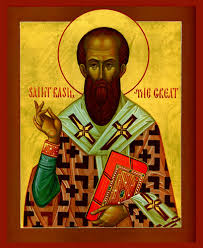 On Holy Saturday, April 11th this year, we celebrate the Divine Liturgy of Saint Basil, as we have on all the Sundays of Great Lent. We return to the Liturgy of Saint John Chrysostom on Holy Pascha.
On Holy Saturday, April 11th this year, we celebrate the Divine Liturgy of Saint Basil, as we have on all the Sundays of Great Lent. We return to the Liturgy of Saint John Chrysostom on Holy Pascha.
The prayers of Saint Basil’s Liturgy are rich in meaning. For example, they are filled with reminders of the incredible things God has done for us. The First Prayer of the Faithful begins, “Thou, Lord, hast revealed to us this great mystery of salvation.” The Offertory Prayer addresses God, “O Lord, our God, who hast created us and brought us into this life, who has shown us the ways to salvation, and bestowed on us the revelation of heavenly mysteries…”
In the Prayer of Commemoration, Saint Basil names some ways God did these things: by speaking to us through the prophets, enabling saints to do mighty works, giving us the Law as a help, and appointing angels as our guardians. Then, in the fullness of time, He gave the greatest gift of all, sending His Son who was God before the ages but was “likened to the body of our lowliness, that He might liken us to the image of His glory.”
Saint Basil asks God to show His mercy to human beings in all kinds of situations, with complete trust that He will do so. For catechumens Basil asks, “Grant them a light yoke.” With human frailty in mind he calls on God to remember the people who might not be remembered in prayer by those serving at the altar “through ignorance, forgetfulness, or the multitude of names…” As part of the long First Prayer of Intercession he asks God to “defend the widows, protect the orphans, free the captives, heal the sick” and remember those in courts, mines, exile, harsh labor, affliction, necessity or distress.
In a series of questions, Basil expresses his own wonder at God’s magnificence: “Who can utter Thy mighty acts? Or make all Thy praises known? Or tell of all Thy miracles at all times?”
In the Prayer of Preparation, Saint Basil acknowledges the responsibility we assume by receiving the Body and Blood of Christ. He asks that God “let none of us be guilty of these, Thy heavenly Mysteries, nor be infirm in soul and body by partaking of them unworthily.” Instead, may our receiving them worthily be “a support on the road to eternal life and an acceptable defense at the dread judgment seat of Thy Christ.”
|
Troparion – Tone 1 Your proclamation has gone out into all the earth Which was divinely taught by hearing your voice |
These prayers reflect many things we know of Saint Basil as a person. He gave comfort and care to those in all kinds of need, and lovingly interacted with lepers centuries before the famous Father Damian of Molokai did so. He enjoyed and was humbly amazed by the beauty of God’s creation and miracles. He saw it as every Christian’s duty to realize the great privilege of Eucharistic participation.
Saint Basil’s many writings also express these things. But by worshipping at the Liturgy bearing his name, we share them with him, as part of the Church he described as stretching “from end to end of the universe.”
